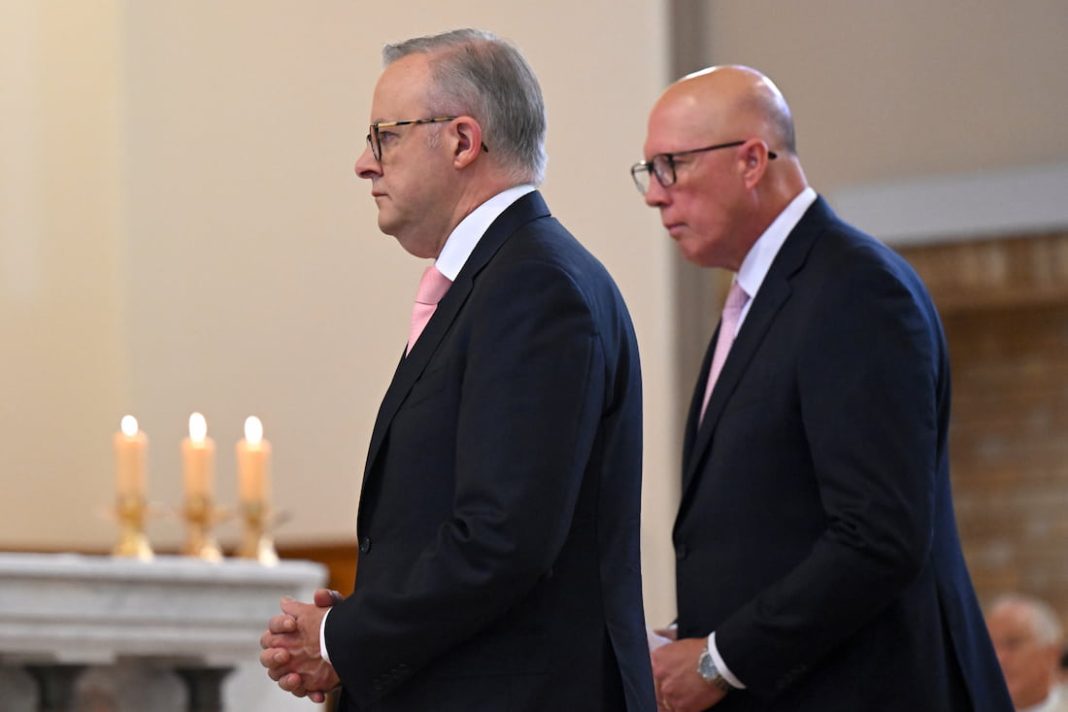Federal politicians set aside their differences at church service to welcome in the new parliamentary year, but the pause in hostilities didn’t last long.
Prime Minister Anthony Albanese and Opposition Leader Peter Dutton were amongst the MPs at the ecumenical service in Canberra on Tuesday, which marked the first sitting day for 2025.
Both leaders would have been praying for success at the ballot box, amid expectations this sitting fortnight could be the last time MPs gather in parliament before voters head to the polls in the next three months.
With both major parties neck and neck in the polls, the prime minister expressed confidence in Labor’s record.
“We begin the parliamentary year with inflation falling, wages rising, and with unemployment low,” he told reporters outside St Christopher’s Cathedral in Forrest.
“We do need hope, and we need optimism, and as we begin the parliamentary year, that’s precisely what I have.”
Issues including the cost of living, hate speech laws and gambling reform are set to dominate this session of parliament, as each leader sharpens their pitches to the public ahead of the formal election campaign.
Mr Dutton said there was hard work ahead to regain government as the Liberals and Nationals take the fight to Labor.
“We have an opportunity to – as John Howard and Peter Costello did – to get into government, to clean up Labor’s mess, and to make the decisions which are necessary to help families, not to hurt them,” he later told MPs at a joint party room meeting.
“We have, I think, a prime minister who is living in a parallel universe at the moment.
“The prime minister says that, essentially, families have never had it better off because inflation is off a bit, but all these prices are up.”
The election must be held by May 17 and a date is yet to be set.
The most recent Newspoll had the coalition ahead of Labor 51-49 per cent on a two-party preferred basis.
But a Roy Morgan poll on Monday had the two at 50-50 per cent on a two-party preferred basis, likely driven by better inflation figures and the prospects of a rate cut.
This suggests the election could result in a hung parliament, with both major parties requiring the support of minor parties and independents to form a minority government.
Mr Albanese said Labor’s campaign would not be based on fear.
“Kindness is a strength. Compassion is a strength. It’s a strength of our country,” he said.
“One of the big divides in Australian politics is between my leadership, which is optimistic, which is one of hope for a better future, which has a practical plan to create that better future … as opposed to a campaign of fear.”
But Mr Dutton said the prime minister’s optimism did not mean relief from the cost of living.
“There are families who thought two-and-a-half-years ago that this was going to be a government for them, and that this was going to be a prime minister who understood their concerns. It’s been anything but that,” he said.
“We know that the prime minister’s not up to his task, and we know that there are many families suffering because of it.”
Over the next two weeks, Mr Albanese will attempt to push the remainder of his government’s policy agenda through parliament.
Stronger hate crimes protections will be debated on Tuesday as the government responds to escalating anti-Semitic attacks.
The government will also introduce legislation to guarantee access to the childcare subsidy for three days a week, removing the current activity test model for early childhood education support.
The bill’s progress has been boosted after the Greens agreed to back the measure in the Senate.



